上海教育出版社六年英语上知识点
沪教牛津版六年级英语上册全册知识点点汇总
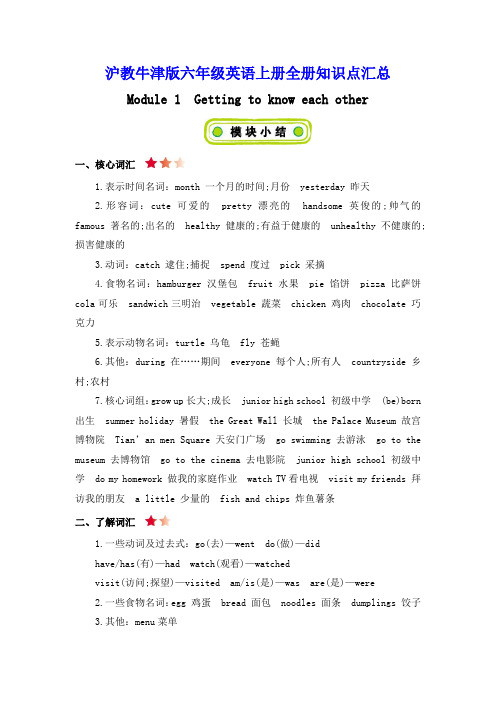
沪教牛津版六年级英语上册全册知识点汇总Module 1 Getting to know each other一、核心词汇1.表示时间名词:month 一个月的时间;月份yesterday 昨天2.形容词:cute 可爱的pretty 漂亮的handsome 英俊的;帅气的famous 著名的;出名的healthy 健康的;有益于健康的unhealthy 不健康的;损害健康的3.动词:catch 逮住;捕捉spend 度过pick 采摘4.食物名词:hamburger 汉堡包fruit 水果pie 馅饼pizza 比萨饼cola可乐sandwich三明治vegetable 蔬菜chicken 鸡肉chocolate 巧克力5.表示动物名词:turtle 乌龟fly 苍蝇6.其他:during 在……期间everyone 每个人;所有人countryside 乡村;农村7.核心词组:grow up长大;成长junior high school 初级中学(be)born 出生summer holiday 暑假the Great Wall 长城the Palace Museum 故宫博物院Tian’an men Square 天安门广场go swimming 去游泳go to the museum 去博物馆go to the cinema 去电影院junior high school 初级中学do my homework 做我的家庭作业watch TV看电视visit my friends 拜访我的朋友 a little 少量的fish and chips 炸鱼薯条二、了解词汇1.一些动词及过去式:go(去)—went do(做)—didhave/has(有)—had watch(观看)—watchedvisit(访问;探望)—visited am/is(是)—was are(是)—were2.一些食物名词:egg 鸡蛋bread 面包noodles 面条dumplings 饺子3.其他:menu菜单三、核心句型1.Her hair was short and her eyes were big. 她那时头发很短而且眼睛很大。
(完整word版)上海教育出版社六年英语上知识点

Unit One Growing up、补全单词并写出汉语1、m __ n __ h _____2、fl ___________ 3 c __ t __h _________ ; _______ 4、t __ rtl ______________ 5 h __ nds __ me _________ ; _________ 6 pr __tt ________、词组、句式1、长大、成长_____________2、初级中学___________________3、出生___________ 4她的头发__________ 5在图1中______________ 6 baby (复数) ___________ ,名词变复数规则之一,以____________________ + y结尾的单词,将y变_再加上____ 7、两个月大____________ 8又小又可爱_________________ 9She was small and cute. _______________ 10small (反) ____ 11、is (过去式) __ ,am (过去式)___ 12、(那时)她的眼睛很大_____________ 13、old(反)___ 14、short (反) _____ 15、a primary school student_________ 16 Now she _______ (be) 14 years old , She ____ (go) to junior high school . 17 junior high school __________________ 16 pretty (同义词)___19、Her hair __ (be) long . 20 在河里____________ 21 black (反) ____ 22、look around ________ 23 He can find his mum .否)_______________ 24、She ____ (have) a round head and a long tail . 25fish 复) ____ 26She has a tail .否)____________ . 27 she's =_______ 28 I'm in the room._____________ 29 fly (复) ___ 30、I am your mum .(一般疑问句,否回)_____________ 31、抓苍蝇____ 32、In this photo, my sister(be) one year old . 33、她的头发很短34、grow(现分)_____ 35 She is a baby .用过去时改写) _____________ 36 She was about six years old .(否定句)__________________ .(一般疑)Unit Two My summer holiday补全单词并写出汉语1、f__ m _4us :v ry ne2、d r: 5、c3、sp nd untrs de■6、p ck 7、s mm r h l d y词组、句式1、fun (汉);(形容词)2、拜访我的爷爷奶奶 3 去海滩4、go(过去式)5、和我的家人6、there (同音词);(对应词)7、玩球类游戏8去游泳9、在海里10、…怎么样.11、My summer holiday was fun . 12 、I (go)toBeijing yesterday. 13 长城14天安门广场15 故宫博物院16、take (过去式)仃、拍许多照片式) ____ 21、You can see my photos一般疑) __________ 22 during the summer holiday _____________ 23、在八月___________ 24、visit(过去式)_____ 25去拿______ 26乘飞机 _____________ 27、英国(缩写) ____ 28 回到访朋友).Unit Three Healthy and unhealthy、补全单词并写出汉语1、h ____ l th _________ ; ______2、__ nh ____ lth _________ ;_______ 3h mb rg r ________________ 4 c l _________ 5 y st rd y _______________6、fr ____ t______7、p __ e ___ 8 p __ zz ______ 9 s __ndw __ ch ______ 10、v __ g __ t __ bl __________ 11 ch __ ck __ n _________、词组、句式1、少量的______________2、炸鱼薯条_________________3、今天早晨____________ 4吃早饭 ___________ 5、I (have) two apples yesterday.6、healthy (反)_____7、I had two hamburgers for breakfast. _________8、I had two hamburgers 否) ___________ 9 He had two hamburgers for breakfast. ___________ 10、喝一些牛奶_______________ 11、吃一些水果________ 12、吃少量的肉 _____________ 13太多的肉 ________________ 14 What about you?(汉)_____________ 15、I didn 'have breakfast this morning.(肯) ___________ 16 吃午饭 _____________ 17、吃晚饭__________ 18每天________ 19 一个鸡蛋和一个苹果 ____________________ 20 Breakfastis important ____ u s, I ______ (have) some bread and some ___ (milk) this morning, I also had an ______ and an apple. 21、Joe had two _______ and some cola, That is not ______ . He should drink some _____ and eat some _____________ .22、sandwich复)________ 23、大量的米饭_______ 24 吃一些鱼_______ 25吃少量的甜食_____________ 26做运动____ 27、又强壮又健康_____________ 28许多糖___________ 29 Lily and Bob play sports very often.否)_____________ 30 fat (反) __ 31、健康的孩子们_________ 32 have poor eating habits _____________ 33 今天早上早餐你吃什么了?_ 我吃了一些面包,喝了一些牛奶_______________ 34喜欢吃饺子 ________________ 35昨天,基蒂早餐喝了一些牛奶,吃了一些面包。
沪教牛津版六年级英语上册全册知识点点汇总

沪教牛津版六年级英语上册全册知识点汇总Module 1 Getting to know each other一、核心词汇1.表示时间名词:month 一个月的时间;月份yesterday 昨天2.形容词:cute 可爱的pretty 漂亮的handsome 英俊的;帅气的famous 著名的;出名的healthy 健康的;有益于健康的unhealthy 不健康的;损害健康的3.动词:catch 逮住;捕捉spend 度过pick 采摘4.食物名词:hamburger 汉堡包fruit 水果pie 馅饼pizza 比萨饼cola可乐sandwich三明治vegetable 蔬菜chicken 鸡肉chocolate 巧克力5.表示动物名词:turtle 乌龟fly 苍蝇6.其他:during 在……期间everyone 每个人;所有人countryside 乡村;农村7.核心词组:grow up长大;成长junior high school 初级中学(be)born 出生summer holiday 暑假the Great Wall 长城the Palace Museum 故宫博物院Tian’an men Square 天安门广场go swimming 去游泳go to the museum 去博物馆go to the cinema 去电影院junior high school 初级中学do my homework 做我的家庭作业watch TV看电视visit my friends 拜访我的朋友 a little 少量的fish and chips 炸鱼薯条二、了解词汇1.一些动词及过去式:go(去)—went do(做)—didhave/has(有)—had watch(观看)—watchedvisit(访问;探望)—visited am/is(是)—was are(是)—were2.一些食物名词:egg 鸡蛋bread 面包noodles 面条dumplings 饺子3.其他:menu菜单三、核心句型1.Her hair was short and her eyes were big. 她那时头发很短而且眼睛很大。
沪教版六年级英语上册全册单元知识点
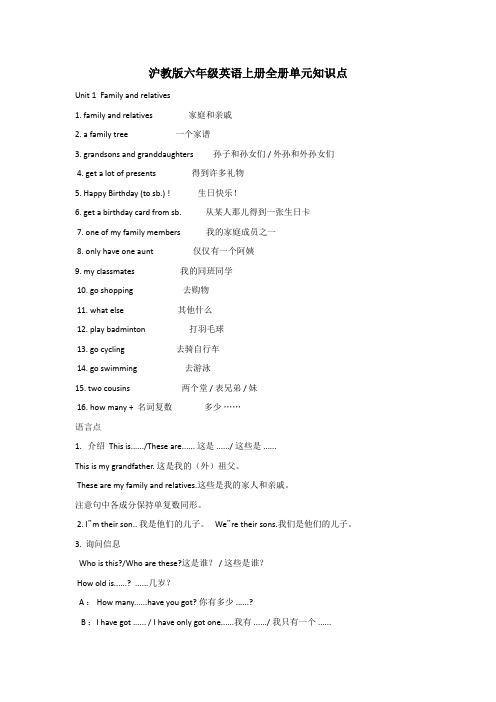
沪教版六年级英语上册全册单元知识点Unit 1 Family and relatives1. family and relatives 家庭和亲戚2. a family tree 一个家谱3. grandsons and granddaughters 孙子和孙女们 / 外孙和外孙女们4. get a lot of presents 得到许多礼物5. Happy Birthday (to sb.) ! 生日快乐!6. get a birthday card from sb. 从某人那儿得到一张生日卡7. one of my family members 我的家庭成员之一8. only have one aunt 仅仅有一个阿姨9. my classmates 我的同班同学10. go shopping 去购物11. what else 其他什么12. play badminton 打羽毛球13. go cycling 去骑自行车14. go swimming 去游泳15. two cousins 两个堂 / 表兄弟 / 妹16. how many + 名词复数多少……语言点1. 介绍 This is....../These are...... 这是 ....../ 这些是 ......This is my grandfather. 这是我的(外)祖父。
These are my family and relatives.这些是我的家人和亲戚。
注意句中各成分保持单复数同形。
2. I‟m their son.. 我是他们的儿子。
We‟re their sons.我们是他们的儿子。
3. 询问信息Who is this?/Who are these?这是谁? / 这些是谁?How old is......? ......几岁?A : How many......have you got? 你有多少 ......?B :I have got ...... / I have only got one......我有 ....../ 我只有一个 ......A : What do you usually do with your......? 你通常和你的 ...... 做......?B :I always/usually/sometimes/never do sth. with my......我总是 / 通常 / 有时候 / 从不和我的 ... 做 ...How many uncles do you have?你有多少个叔叔? How many 后面接可数名词的复数形式。
沪教版牛津英语六(上)语法点
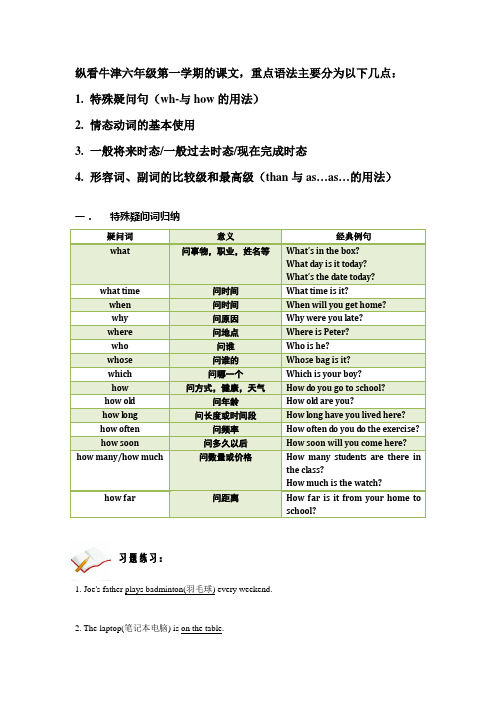
纵看牛津六年级第一学期的课文,重点语法主要分为以下几点:1.特殊疑问句(wh-与how的用法)2.情态动词的基本使用3.一般将来时态/一般过去时态/现在完成时态4.形容词、副词的比较级和最高级(than与as…as…的用法)一.特殊疑问词归纳疑问词意义经典例句what 问事物,职业,姓名等What’s in the box?What day is it today?What’s the date today?what time 问时间What time is it?when 问时间When will you get home?why 问原因Why were you late?where 问地点Where is Peter?who 问谁Who is he?whose 问谁的Whose bag is it?which 问哪一个Which is your boy?how 问方式,健康,天气How do you go to school?how ol d 问年龄How ol d are you?how long 问长度或时间段How long have you lived here?how often 问频率How often do you d o the exercise?how soon 问多久以后How soon will you come here? how many/how much 问数量或价格How many stud ents are there inthe class?How much is the watch?how far 问距离How far is it from your home toschool?习题练习:1. Joe's father plays badminton(羽毛球) every weekend.2. The laptop(笔记本电脑) is on the table.3. My mother is a nurse in the hospital.4. He gets up at 6:30 in the morning.5. Li Lei goes to work on foot.6. It is about 20 kilometers from my home to the town.7. I have lived in Hang Zhou for 20 years.8. I’m looking for my watch.9. The train will start in three minutes.10. Alice has the violin lesson twice a week.11. The building with green wall is the post office.12. He didn’t come because he was ill.注意事项:由于特殊疑问词孩子们从小学就已经开始接触,对于最基本的what/how/where等并不感到陌生,出题的难度一般也不会很大。
沪六年级英文知识点

沪六年级英文知识点沪教版六年级的英文课程是学生英语学习过程中的一个重要阶段,它不仅巩固了之前学习的知识,还为学生提供了更多的语言实践机会,以及更深入的语法和词汇学习。
以下是一些沪教版六年级英文课程中可能会涉及的知识点:1. 词汇积累:学生将学习更多的词汇,包括日常生活用品、学校设施、家庭成员、职业、节日、食物等,同时也会学习一些形容词和动词的用法。
2. 语法结构:语法是英语学习中不可或缺的部分。
六年级的学生会学习更复杂的句型,如条件句、比较级和最高级、过去进行时等。
3. 阅读理解:通过阅读不同题材的文章,学生将提高理解长篇文章的能力,学习如何从文章中提取信息、理解作者意图以及做出推理。
4. 写作技巧:学生将练习写作,包括记叙文、说明文和议论文等。
他们将学习如何组织文章结构,使用恰当的连接词,以及如何写出有说服力的论点。
5. 听说能力:通过听力练习和口语交流,学生将提高他们的听力理解能力和口语表达能力。
这包括理解日常对话、描述事件和表达个人观点。
6. 文化理解:学习英语不仅仅是学习语言,也是了解不同文化的过程。
学生将通过学习英语国家的节日、习俗和文化背景,增加对英语国家文化的了解。
7. 综合运用:学生将有机会将所学知识综合运用到实际情境中,例如参加英语角、进行角色扮演、完成项目作业等。
8. 自我评估:鼓励学生进行自我评估,反思自己的学习过程和成果,以便更好地了解自己的学习习惯和提高学习效率。
通过这些知识点的学习,学生不仅能够提高英语语言能力,还能够培养跨文化交流的意识和能力。
希望这些内容能够帮助学生在英语学习的道路上更进一步。
上海教育出版社六年英语上知识点
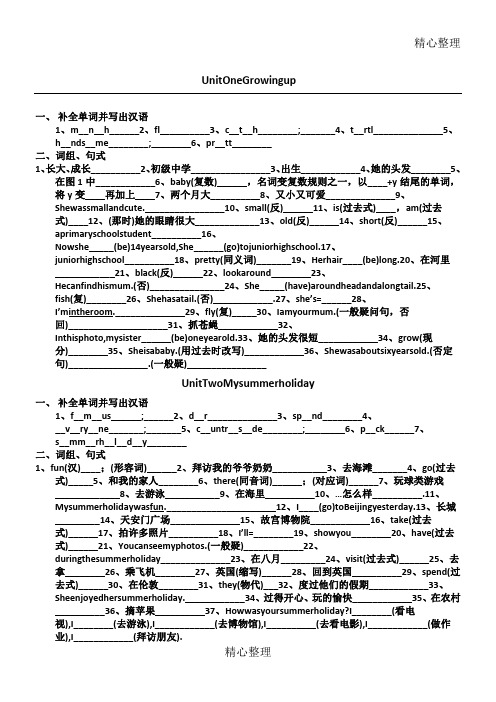
精心整理UnitOneGrowingup一、补全单词并写出汉语1、m__n__h______2、fl__________3、c__t__h________;_______4、t__rtl______________5、h__nds__me________;________6、pr__tt________二、词组、句式1、长大、成长__________2、初级中学________________3、出生____________4、她的头发________5、在图1中____________6、baby(复数)______,名词变复数规则之一,以____+y结尾的单词,、、I’否定一、11、过去、Mysummerholidaywasfun.______________________12_________14、天安门广场______________15、故宫博物院____________16、take(过去式)______17、拍许多照片__________18、I’ll=________19、showyou________20、have(过去式)______21、Youcanseemyphotos.(一般疑)____________22、duringthesummerholiday______________23、在八月_________24、visit(过去式)______25、去拿________26、乘飞机________27、英国(缩写)______28、回到英国__________29、spend(过去式)______30、在伦敦________31、they(物代)___32、度过他们的假期____________33、Sheenjoyedhersummerholiday.____________34、过得开心、玩的愉快____________35、在农村__________36、摘苹果__________37、Howwasyoursummerholiday?I________(看电视),I________(去游泳),I____________(去博物馆),I__________(去看电影),I____________(做作业),I____________(拜访朋友).UnitThreeHealthyandunhealthy一、补全单词并写出汉语1、h____lth________;______2、__nh____lth________;______3、h__mb__rg__r________4、c__l________5、y__st__rd__y________6、fr____t______7、p__e____8、p__zz______9、s__ndw__ch______10、v__g__t__bl__________11、ch__ck__n________二、词组、句式1、少量的__________2、炸鱼薯条____________3、今天早晨____________4、吃早饭________5、I____(have)twoapplesyesterday.6、healthy(反)________7、Ihadtwohamburgersforbreakfast.__________8、Ihadtwohamburgers(否)____________9、Hehadtwohamburgersforbreakfast.____________10、喝一些牛奶____________11、吃一些水果、吃午、一、11、IplaywithMike.__________10、在我家__________11、Iplayedchesswithhimatschool.(否)______________12、打乒乓球___________13、noise(形)______14、____(a\an)owl15、在森林里__________16、alotof______(noise)17、live(过)______18、make(过)______19、can(过)______20、发出声音______________21、在夜晚____________22、say(过)______23、Theowllistened(否定句)______________.24、Please______(stop)makingnoise.25、stopmakingnoise______________26、oneofthe_______crabbit.27、挖洞_____________28、dig(过)______29、haveagoodsleep____________30、there(同)______(反)________31、______(neighbour)name32、____ismyneighbour,Sheis____(age),Sheisa\an____(job),Ioften__________withhim\her,(下棋)Isometimes________(看电视),Lastweekend,We____________(看电影)together.UnitFiveAnimalsindanger一、补全单词并写出汉语1、th__us__nd______2、h__ndr__d______3、w__ld______;______4、w__y______;______;______5、d__e______;______6、rh__n________7、l____rn______;______8、s__nd______;______;______二、词组、句式1、华南虎__________2、蓝鲸__________3、面临危险____________4、在过去______________5、照顾、照料____________6、去散步__________7、赶走____________8、、、、一、1、1、、我们意、、、喜didn’t=______26、Iwouldliketogotothecinemawithyou.(一般疑、肯、否回)________________________________________27、wouldn’t=_________28、wouldlike______(do)sth29、Wouldyoulike___________(下棋)?No,__________.Wouldyou__________(看电视)?Yes,__________.30、Wouldyouliketo…?Yes,________.No,________.UnitSevenSeeingafilm一、补全单词并写出汉语1、sh__ll______2、pr__nc__ss________3、p__l__c_______;_____4、__xc__t__ng________;________5、br__v__________6、p__l__c__m__n______7、b__r__ng________8、qu____n________9、m__rr__r______10、fa__r__st______11、k__ll_____12、__sl____p____二、词组、句式1、下次__________2、从前_________3、睡着____________4、去看电影________5、Shallwe…?________6、Metoo________7、I’dliketoseeSnowWhite.________________8、astoryaboutabeautifulprincess______9、遇见七个小矮人____________10、一部有趣的电影______________11、一部令人兴奋的电影_______________12、catch(单三)_______13、good(反)______14、坏人______15、I’d_______(alsoloke\likealso)toseeSnowWhite.16、在星期日下午____________17、下周六__________18、、1、、UnitNineGreatcitiesoftheworld一、补全单词并写出汉语1、c__p__t__l______2、n__rt________;______3、__as________;_______4、w__st______;______5、s__ut________;______6、p__l__ce________;______7、m__st_____;______8、t__ur__st______9、bu__ld__ng______;_______10、s__sh__________二、词组、句式1、在…北部__________2、在…东部____________3、中国的首都__________4、在中国的北部____________5、在中国的东方____________6、city(复)______7、离…远__________8、乘火车____________9、到达上海____________10、Ittakesaboutfivehours._______________11、IttakesaboutfourhoursfromBeijingtoShanghaibytrain._____________________12、非常快__________13、喜欢参观___________14、长城______________15、北京人__________16、喜欢吃饺子____________17、日本的首都__________18、许多高楼__________19、许多游客____________20、喜欢购物______________21、东京人______________22、英国的首都______________23、BeijingisinChina.____________________24、TouristscanfindmuseumspalacesinBeijing.____________________25、PeopleinLondonloveeatingfishandchips.___________________26、BigBen______27、aclocktower__________28、Isawalotofinsects.__________________UnitTenAir一、补全单词并写出汉语、1、没、、、match(复)________13、唱歌________14、Thebirdis____(on\in)thetree.15、Apples____(in\on)thetree.16、飞向南方______________17、nextspring__________18、Spring_____(come).19、回来____________20、Shecannot________(see\look\lookat)thetree.21、把它砍到____________22、take______(he),take(过)______.23、takeit_____afactory.24、I’m______(look)formyfriend.25、cuthimintofood______________26、做火柴___________27、besideafire__________28、在你家________29、Therearesomematches.(否)______________30、singasadsong____________31、Thebirdsingsasadsong______(to\at)thefire.32、fly(单三)______33、飞走________34、植树节____________35、三月十二日_______________UnitTwelveTheEarth一、补全单词并写出汉语1、__ar__h______2、__p__rt______;______3、f__r__st______4、l__nd______5、__c__an________6、r__bb__sh______7、s__ck__________8、r__c__cl________9、gl__ss_____;_____10、__wn______二、词组、句式1、这么多__________2、捡起、拾起__________3、购物袋___________4、塑料袋____________5、Look_____thispicture.6、It’stheearth.__________7、thegreenandbrown_____(part).8、Thebluepartsareoceans._______________9、又干净又美丽__________________.10、在过去________11、Someparts_____(be)dirty.12、Canwedo_______(something)tohelptheEarth?13、扔垃圾______________.14、停止扔垃圾____________________15、把垃圾扔进河里________________16、这么多的树____________17、使用塑料袋_________________18、停止、。
沪教小学英语(三年级起点)六年级(上)知识点汇总

fe1.3.语音:2.词组:b规spe3.语音:e句借助didn'可数名词和2.there be 句3.重点walk/drive asawould2.Shoul3.ch g语音:语法知识动词的一般过去时,was和were的用法2.词组:be born in3.语音:e的字母组合及y,i的发音意动词的一般过去时,动词过去式的变化规则2.不规则动词的过去式:took went didspent3.语音:e a ea的发音意动词的一般过去时的否定句,一般疑问句。
借助didn't或者did2.a lot of/a little/some的用法,可数名词和不可数名词3,不规则动词的过去式:(had ate)区分:一般现在时和一般过去时的区别2.不规则动词的过去式:made could1.数词千百的用法2.there be 句型的过去时3.重点词汇be in danger/take care of/go for awalk/drive away/grow up4.不规则动词的过去式:drove found sentsaw点句型:Would you like to have e-friend in other countries?Yes,I'd like to./No,Iwouldn't.1.一般将来时和一般过去时的区别2.不规则动词的过去式:ran met came gavefell3.语音:s c z s ts ds的发音1.过去时的特殊疑问句2.不规则动词的过去式:bought learnt3.语音:or al au oor o a的发音1.by用法;How long 用法2.词汇:in the north/east/south/west of3.语音:-r的发音1.make,keep的用法2.Should 用法3.ch g j sh s动词短语语音:tr drstop的用法;should的用法。
牛津英语(上海版)6年级上学期知识点罗列(1)
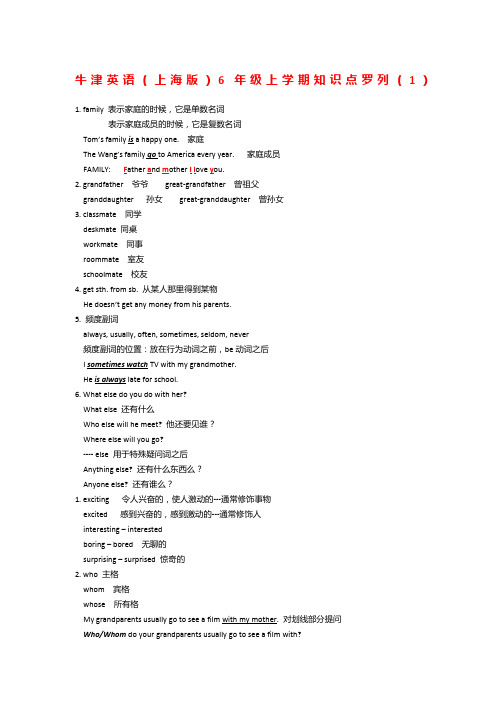
牛津英语(上海版)6年级上学期知识点罗列(1)1. family 表示家庭的时候,它是单数名词表示家庭成员的时候,它是复数名词Tom’s family is a happy one. 家庭The Wang’s family go to America every year. 家庭成员FAMILY: F ather a nd m other I l ove y ou.2. grandfather 爷爷great-grandfather 曾祖父granddaughter 孙女great-granddaughter 曾孙女3. classmate 同学deskmate 同桌workmate 同事roommate 室友schoolmate 校友4. get sth. from sb. 从某人那里得到某物He doesn’t get any money from his parents.5. 频度副词always, usually, often, sometimes, seldom, never频度副词的位置:放在行为动词之前,be动词之后I sometimes watch TV with my grandmother.He is always late for school.6. What else do you do with her?What else 还有什么Who else will he meet? 他还要见谁?Where else will you go?---- else 用于特殊疑问词之后Anything else? 还有什么东西么?Anyone else? 还有谁么?1. exciting 令人兴奋的,使人激动的---通常修饰事物excited 感到兴奋的,感到激动的---通常修饰人interesting – interestedboring – bored 无聊的surprising – surprised 惊奇的2. who 主格whom 宾格whose 所有格My grandparents usually go to see a film with my mother. 对划线部分提问Who/Whom do your grandparents usually go to see a film with?3. Watching TV is one of the most important activities of the day.动名词短语做主语。
沪教版六年级英语上册-全套复习资料
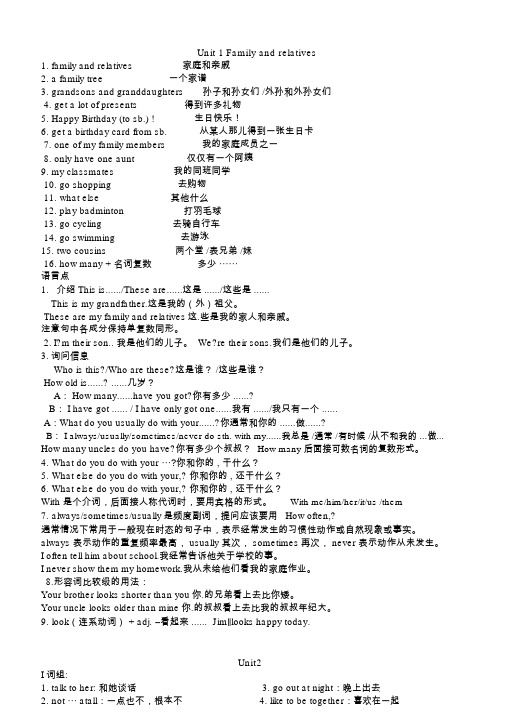
1. family and relativesUnit 1 Family and relatives 家庭和亲戚2. a family tree一个家谱3. grandsons and granddaughters孙子和孙女们 /外孙和外孙女们4. get a lot of presents得到许多礼物5. Happy Birthday (to sb.) !生日快乐!6. get a birthday card from sb.从某人那儿得到一张生日卡7. one of my family members我的家庭成员之一8. only have one aunt仅仅有一个阿姨9. my classmates我的同班同学10. go shopping去购物11. what else其他什么12. play badminton打羽毛球13. go cycling去骑自行车14. go swimming去游泳15. two cousins两个堂 /表兄弟 /妹16. how many + 名词复数多少⋯⋯语言点1.介绍 This is....../These are......这是 ....../这些是 ......This is my grandfather.这是我的(外)祖父。
These are my family and relatives这.些是我的家人和亲戚。
注意句中各成分保持单复数同形。
2.I?m their son.. 我是他们的儿子。
We?re their sons.我们是他们的儿子。
3.询问信息Who is this?/Who are these?这是谁? /这些是谁?How old is......? ......几岁?A: How many......have you got?你有多少 ......?B: I have got ...... / I have only got one......我有 ....../我只有一个 ......A:What do you usually do with your......?你通常和你的 ......做......?B: I always/usually/sometimes/never do sth. with my......我总是 /通常 /有时候 /从不和我的 ...做... How many uncles do you have?你有多少个叔叔?How many 后面接可数名词的复数形式。
(word完整版)牛津沪教版英语六年级上重点知识复习及练习
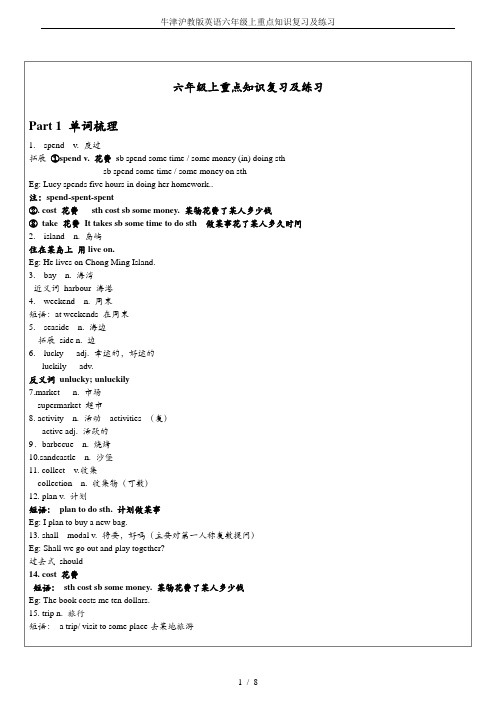
2. “Instead of helping you, your own language gets in your way.”This sentence means that memorizing your own language can ________.A.help you to study English wellB.stop you mastering EnglishC.make English easy to learnD.help you notice mistakes3.Equally important is to feel the language. “to feel the language” here means________.A.to get a knowledge of English by touchingB.to be able to read and write EnglishC.to translate English into your own by imaginingD.to be able to experience the rich sensation of the languageBWhen we can see well, we do not think about our eyes often. It is only when we can not see perfectly that we come to see how important our eyes are.People who are nearsighted can only see things that are very close to their eyes. Many people who do a lot of close work, such as writing and reading, become nearsighted. Then they have to wear glasses in order to see distant things clearly. People who are farsighted face just the opposite problem. They can see things that are far away, but they have difficulty reading a book unless they hold it at arm’s length. If they want to do much reading, they must get glasses too.Other people do not see clearly because their eyes are not exactly the right shape. This, too, can be corrected by glasses. Some people’s eyes become cloudy because of cataracts. Long ago these people often became blind. Now, however, it is possible to operate on the cataracts and remove them.When night falls, colors become fainter to the eyes and finally disappear. After your eyes have grown used to the dark, you can see better if you use the side of your eyes rather than the centers. Sometimes, after dark, you see a small thing to one side of you, which seems to disappear if you turn your head in its direction. This is because when you turn your head, you are looking at the thing too directly. Men on guard duty sometimes think they see something moving to one side of them. When they turn to look straight at it, they can not see it any more, and they believe they were mistaken. However, this mistake happens because the center of the eye, which is very sensitive in daylight, is not as sensitive as the sides of the eye after dark.4.We don’t know that our eyes are of great importance until ________.A. we think about our eyesB. we cannot see clearlyC. we wear glassesD. we have to do much reading5.According to the passage, a ________ is more likely to be nearsighted.A.tailorB. doctorC. guardD.painter6.People who are farsighted ________ .A.cannot do a lot of close work without glassesB.can only see things that are very close to their eyesC.have difficult y reading a book if they hold it at arm’s lengthD.have the same problem as the nearsighted people7.To see a small thing at night, it is better to look ________ .A.with wide open eyesB.with half shut or narrowed eyesC.straight at itD.in a slightly different directionC Read and answer the questions.Children from all over the word like to celebrate (庆祝) their birthdays. American children are of no difference. American children usually celebrate with a party. They invite their friends to join the party. The party may not be held on the exact date of birthday if it comes to a school day. It may be held on the closest weekend instead.Today two kinds of parties are the most popular. One is held at home. Parents make their house beautiful with balloons and coloured paper. They prepare a special birthday meal. The children play games. The other one is held away from home. Some are at a special restaurant. The children eat pizza and ice cream. The waiters, who serve the food, also sing and tell jokes to the children. Other parties may be held at a park, a movie theatre or some other places.( ) 2 They are going to the supermarket by bus.( ) 3 The supermarket is not far away from their home.( ) 4 Dick's mother is going to buy a lot of food for the next week.( ) 5 Dick is going to buy a video game machine but he can't play it all the time.( ) 6 They are going to stay in the supermarket for 5 hours.Ⅴ.Choose the right answer.It's Sunday. Mother, father and the children are going to the beach.Alice: Where are we going, Dad?Father. Let's look at the map. Let me see. We will go to the East Point Beach.Mother: We'll swim in the sea.David: Are we going to have a picnic?Alice: Yes, of course.David: That's nice.Father: Come on! Let's all get in the car!Alice: What's wrong (怎么了), Dad?Father: The car can't start (发动)!Mother: So we will all stay at home.Alice: Let's have a picnic in the garden!David: Great!( )1 The family is going to ____________ .A. swim in the seaB. have a picnicC. swim and have a picnic( )2 They are going there ____________ .A. by busB. by carC. by underground( )3 They won't go to the beach ______________ .A. because it is rainyB. because Father is not fineC. because the car doesn't start( ) 4 They will have the picnic _____________ in the end.A. on the beachB. in the gardenC. in the carⅥ.Read the passage and fill in the blanks with proper words.It will be grandfather's s______________ birthday next Sunday. We are going to have a big birthday p____________. Uncles and aunts will buy some p______________for him. But I want to make a nice birthday c______________for grandfather. Mum and Dad are going to buy a lot of food from the s______________.【Keys】I. 1. Tom is speaking Chinese.。
六年级上册英语沪教牛津版知识要点

Module 1 Getting to know each other一、核心词汇1.表示时间名词:month 一个月的时间;月份yesterday 昨天2.形容词:cute 可爱的pretty 漂亮的handsome 英俊的;帅气的famous 著名的;知名的healthy 健康的;有益于健康的unhealthy 不健康的;损害健康的3.动词:catch 逮住;捕捉spend 度过pick 采摘4.食物名词:hamburger 汉堡包fruit 水果pie 馅饼pizza 比萨饼cola 可乐sandwich 三明治vegetable 蔬菜chicken 鸡肉chocolate 巧克力5.表示动物名词:turtle 乌龟fly 苍蝇6.其他:during 在……期间everyone 每个人;所有人countryside 乡村;农村7.核心词组:grow up 长大;成长junior high school 初级中学(be)born 出生summer holiday 暑假the Great Wall 长城the Palace Museum 故宫博物院Tian’an men Square 天安门广场go swimming 去游泳go to the museum 去博物馆go to the cinema 去电影院junior high school 初级中学do my homework 做我的家庭作业watch TV 看电视visit my friends 拜访我的朋友a little 少量的fish and chips 炸鱼薯条二、了解词汇1.一些动词及过去式:go(去)—went do(做)—didhave/has(有)—had watch(观看)—watchedvisit(访问;探望)—visited am/is(是)—was are(是)—were 2.一些食物名词:egg 鸡蛋bread 面包noodles 面条dumplings 饺子3.其他:menu 菜单三、核心句型1.H er hair was short and her eyes were big. 她那时头发很短而且眼睛很大。
沪教版英语知识点六年级

沪教版英语知识点六年级沪教版英语是上海地区广泛使用的英语教材,针对六年级学生,其知识点涵盖了词汇、语法、句型结构、阅读理解以及口语交际等多个方面。
以下是一些六年级沪教版英语的主要知识点:# 词汇- 日常生活词汇:如家庭成员、学校用品、日常活动等。
- 描述性词汇:如颜色、形状、大小、感觉等形容词。
- 动词短语:如“take off”(脱下)、“put on”(穿上)等。
# 语法- 一般现在时:描述习惯或经常发生的动作。
- 现在进行时:表示正在发生的动作。
- 一般过去时:描述过去发生的动作或状态。
- 一般将来时:表达将来的计划或预测。
# 句型结构- 简单句:主语+谓语+宾语/表语。
- 并列句:使用“and”、“but”等连词连接两个简单句。
- 复合句:主句+从句,如时间状语从句、条件状语从句等。
# 阅读理解- 理解文章的主旨大意。
- 识别细节信息,如人物、地点、时间等。
- 推断作者的意图和态度。
# 口语交际- 问候和告别:如“Hello”、“How are you?”、“Goodbye”等。
- 表达喜好和不喜欢:如“I like...”、“I don't like...”。
- 询问和回答:如“What's your name?”、“My name is...”。
# 写作技巧- 写日记:记录一天的活动和感受。
- 写信:表达情感、分享信息或提出问题。
- 描述性写作:描述人、物、地点等。
# 文化意识- 了解不同国家的节日和习俗。
- 学习简单的英语歌曲和诗歌。
- 认识英语国家的一些基本地理知识。
# 学习策略- 制定学习计划,合理安排学习时间。
- 通过多种方式学习,如听、说、读、写。
- 与同学合作学习,共同进步。
通过这些知识点的学习,六年级学生能够打下坚实的英语基础,为进一步的英语学习做好准备。
教师在教学过程中应注重培养学生的兴趣和自主学习能力,帮助他们形成良好的学习习惯。
沪教版六上英语知识点总结

沪教版六上英语知识点总结Unit 1:Hello, boys and girls!本单元主要介绍基本的问候语和自我介绍的表达方式,学习了英式英语的发音及正确的读音。
重点掌握句型:Hello! I’m...等.Unit 2:Let’s make friends!本单元教授介绍他人的基本信息,学习了一些国家名称和对应的国旗,并学习了一些基本的对话,重点掌握句型:This is...He/She is...等。
Unit 3:I lost my books.本单元主要学习校园调查,掌握一些关于寻物启示和寻物启示的表达方式,以及表达自身丢失物品的相应句型,重点掌握句型:Whereis/are...? I lost my...等。
Unit 4: Nice to meet you.本单元主要学习了询问姓名和称呼的方式,能够正确地用英语自我介绍,并初步了解了中国传统节日,春节。
掌握一些节日问候语,重点掌握句型:What’s your name? My name is... Nice to meet you.等。
Unit 5: I have a small cat.本单元主要学习动物的名称,掌握询问和回答动物名称的句型,了解动物的习性和特征,掌握描述动物特征的形容词,重点掌握句型:What’s this/that? It’s a/an...等。
Unit 6: How many apples do you want?本单元主要学习数字1-100的表达方式,能够详细描述物品的数量,能够向他人询问需要的数量,重点掌握句型:How many...do you want?I want...等。
Unit 7: How much are these socks?本单元主要学习货币和购物的表达方式,能够向店员询问物品价格,并描述钱的数量,重点掌握句型:How much is/are...? It’s... Yuan.等。
Unit 8: What would you like?本单元主要学习点餐、介绍食物和饮料的名称,以及询问对其中一种食物和饮料的喜好程度,了解不同国家的饮食文化,重点掌握句型:What would you like? I’d like...等。
(完整word版)上海教育出版社六年英语上知识点.doc

(完整word版)上海教育出版社六年英语上知识点.docUnit One Growing up一、补全单词并写出汉语1、m __ n __ h ______2、fl __ ________3、c __ t __h ________ ; _______4、t __ rtl __ ____________5、h __ nds __ me ________ ; ________ 、6pr __tt__ ______二、词组、句式1、长大、成长__________2、初级中学________________3、出生____________ 4、她的头发________ 5、在图 1 中 ____________ 6、baby (复数) ______ ,名词变复数规则之一,以 ____ + y 结尾的单词,将 y 变 ____再加上____ 7、两个月大__________ 8、又小又可爱______________ 9、She was small and cute. ________________ 10、small (反) ______ 11、 is(过去式) ____ ,am (过去式) ____ 12、(那时) 她的眼睛很大_____________13、old(反) ______ 14、 short (反 ) ______ 15、a primary school student__________ 16、Now she _____ (be) 14 years old , She ______ (go) to juniorhigh school . 17、junior high school __________ 18、pretty (同义词 ) _______19、Her hair ____ (be) long . 20、在河里____________ 21、black (反) ______22、look around ________ 23、He can find his mum . (否) _______________24、She _____ (have) a round head and a long tail . 25、fish (复 )________ 26、She has a tail . (否) ____________ . 27、she’s = ______ 28、I ’m in the room.______________ 29、fly (复 ) _____ 30、I am your mum . (一般疑问句,否回 )____________________ 31、抓苍蝇____________ 32、 In this photo, mysister ______ (be) one year old . 33、她的头发很短____________ 34、grow(现分) ________ 35、She is a baby .用(过去时改写) ____________ 36、She was about six years old . ( 否定句 ) ________________ . ( 一般疑 )________________Unit Two My summer holiday一、补全单词并写出汉语1、f __ m __ us ______ ; ______2、 d __ r __ __ __________3、sp __ nd________ 4、 __ v __ ry__ ne _______ ; _______ 5、 c __ untr __ s __ de________ ; ________ 6 、p __ ck ______ 7、 s __ mm __r h __ l __ d __ y________二、词组、句式1、fun (汉 ) ____;(形容词 ) ______2、拜访我的爷爷奶奶___________3、去海滩 _______ 4、go(过去式 ) _____ 5、和我的家人________ 6、there (同音词 ) ______ ;(对应词 ) ______ 7、玩球类游戏_____________ 8、去游泳___________ 9、在海里__________ 10、怎么样__________ . 11、Mysummer holiday was fun . ______________________ 12、I ____ (go) toBeijing yesterday. 13、长城_________ 14、天安门广场______________ 15、故宫博物院____________ 16 、take ( 过去式) ______ 17、拍许多照片__________ 18、I ’ll = ________ 19、 show you ________ 20、have(过去式)______ 21、You can see my photos.一(般疑 ) ____________ 22、during the summer holiday ______________ 23、在八月_________ 24、visit(过去式 )______ 25、去拿________ 26、乘飞机________ 27、英国(缩写) ______ 28、回到英国__________ 29、spend(过去式 ) ______ 30、在伦敦________ 31、they(物代 ) ___ 32、度过他们的假期____________ 33、She enjoyed her summer holiday. ____________ 34、过得开心、玩的愉快____________ 35、在农村__________ 36、摘苹果__________ 37、How was your summer holiday? I ________ (看电视 ),I ________ ( 去游泳), I ____________ ( 去博物馆), I __________ ( 去看电影), I ____________ ( 做作业 ), I ____________ (拜访朋友 ).Unit Three Healthy and unhealthy一、补全单词并写出汉语1、h __ __lth __ ______ ; ______2、 __ nh __ __ lth __ ______ ; ______3、h __ mb __ rg __ r ________ 4、c__ l __ ______ 5、y __ st __ rd__ y ________6、fr __ __ t ______7、p __ e ____8、p __ zz ______9、s __ndw __ ch ______10、 v __ g __ t __ bl __ ________ 11、ch __ ck __ n ________二、词组、句式1 、少量的 __________2 、炸鱼薯条____________3 、今天早晨____________ 4、吃早饭________ 5、I ____ (have) two apples yesterday.6、healthy (反 ) ________7、I had two hamburgers for breakfast. __________8、I had two hamburgers (否) ____________ 9、He had two hamburgers forbreakfast. ____________ 10、喝一些牛奶____________ 11、吃一些水果________ 12、吃少量的肉 ____________ 13、太多的肉____________ 14、What about you? ( 汉 ) ________ 15、I didn ’thave breakfast this morning.(肯) ______________ 16、吃午饭__________ 17、吃晚饭__________18、每天________ 19、一个鸡蛋和一个苹果________________ 20、Breakfast is important ____ us, I _____ (have) some bread and some _____ (milk) this morning, I also had an ______ and an apple. 21 、 Joe had two ______ and some cola, That is not ______. He should drink some ______ and eat some ______.22、sandwich (复) ________ 23、大量的米饭________ 24、吃一些鱼___________ 25、吃少量的甜食__________ 26、做运动__________ 27、又强壮又健康____________ 28、许多糖__________ 29、Lily and Bob play sports very often. 否( ) ______________ 30、 fat (反) ____ 31、健康的孩子们__________ 32、have poor eating habits ____________ 33、今天早上早餐你吃什么了?__________________ 我吃了一些面包,喝了一些牛奶________________ 34、喜欢吃饺子______________ 35、昨天,基蒂早餐喝了一些牛奶,吃了一些面包。
六年级上海版英语知识点

六年级上海版英语知识点一、名词(Nouns)名词是指人或事物的名称,它可以描述一个具体的人、动物、地方、物品,或者是一个抽象的概念。
1. 单数名词(Singular Nouns)和复数名词(Plural Nouns)单数名词表示一个人或事物,而复数名词表示多个人或事物。
通常,在单数名词后加-s或-es来构成复数形式。
例如: - 单数:cat(猫) / desk(书桌)- 复数:cats(猫们) / desks(书桌们)2. 可数名词(Countable Nouns)和不可数名词(Uncountable Nouns)可数名词指可以用数字进行计数的名词,而不可数名词表示无法以单个或确切的数量进行计数的名词。
例如:- 可数名词:book(书) / apple(苹果)- 不可数名词:water(水) / music(音乐)3. 物主代词(Possessive Pronouns)物主代词用来表示所属关系,代替名词的所有格形式。
例如: - 我的:my(我的) / mine(我的)- 你的:your(你的) / yours(你的)二、动词(Verbs)动词表示动作或状态。
它可以告诉我们主语在做什么或是处于什么样的状态。
1. 现在时态(Simple Present Tense)现在时态用来表示习惯性、经常性或普遍性的动作或状态。
通常在动词原形后加-s或-es。
例如:- 我们吃饭。
We eat.- 他喜欢读书。
He likes reading.2. 过去时态(Simple Past Tense)过去时态表示已经发生或结束的动作或状态。
通常在动词过去式后加-ed。
例如:- 我昨天去了公园。
I went to the park yesterday.- 他昨天没有做作业。
He didn't do his homework yesterday.3. 将来时态(Simple Future Tense)将来时态表示将要发生的动作或状态。
六年级上海英语知识点归纳

六年级上海英语知识点归纳一、词汇篇1. 名词(Nouns):- 人 (person): student, teacher, parent, friend- 地方 (place): school, park, library, supermarket- 物品 (object): book, pencil, eraser, ruler- 动物 (animal): cat, dog, bird, fish2. 动词(Verbs):- 行为动词 (action verbs): run, jump, eat, sleep- 状态动词 (state verbs): be, have, like, want- 能力动词 (ability verbs): can, could, may, might3. 形容词(Adjectives):- 性格特点 (personality): kind, friendly, clever, brave - 容貌特征 (appearance): tall, short, thin, beautiful- 物品描述 (object description): blue, big, soft, shiny4. 副词(Adverbs):- 方式副词 (manner adverbs): slowly, loudly, happily, carefully - 程度副词 (degree adverbs): very, quite, too, enough二、语法篇1. 一般现在时 (Simple Present Tense):- 表示经常性的动作或状态,或者客观事实,一般状语可以是频率副词;- 陈述句:主语 + 动词原形 + 其他;- 否定句:主语 + do/does not + 动词原形 + 其他;- 疑问句:Do/Does + 主语 + 动词原形 + 其他?例句:- My brother likes to play soccer. (我的兄弟喜欢踢足球。
上海六年级英语上知识点

上海六年级英语上知识点一、数词和序数词数词用来表示数量,如one,two,three等。
而序数词则表示顺序,如first,second,third等。
二、表示时间的词汇1. 日期:月份先写,然后是日期,例如January 1st。
2. 星期几:用on表示,例如on Monday。
3. 时钟时间:用数字表示,例如7:30。
4. 天气:用形容词来描述,例如sunny,cloudy等。
三、动词时态1. 一般现在时:表示经常性的动作或事实,例如I play basketball every Sunday。
2. 现在进行时:表示正在进行的动作,例如She is reading a book。
3. 一般过去时:表示过去发生的动作,例如He walked to school yesterday。
4. 过去进行时:表示过去某个时间正在进行的动作,例如I was eating dinner at 6 o'clock yesterday。
四、句型转换1. 肯定句转否定句:在动词前加not,例如I am happy. -> I am not happy.2. 肯定句转一般疑问句:将句首的助动词提到主语前,例如You can swim. -> Can you swim?3. 肯定句转特殊疑问句:用特殊疑问词替换要问的内容,例如She likes apples. -> What does she like?五、名词复数形式1. 一般规则:在名词后加-s,例如dogs,books。
2. 以s,x,ch,sh结尾的名词:在名词后加-es,例如buses,boxes。
3. 以辅音字母+y结尾的名词:将y变为i,再加-es,例如butterflies。
六、形容词的比较级和最高级1. 一般的形容词:比较级在词尾加-er,最高级在词尾加-est,例如taller,tallest。
2. 以字母e结尾的形容词:比较级在词尾加-r,最高级在词尾加-st,例如nicer,nicest。
沪教版六上英语知识点总结共31页

谢谢!
36、自己的鞋子,自己知道紧在哪里。——西班牙
37、我们唯一不会改正的缺点是软弱。——拉罗什福科
xiexie! 38、我这个人走得很慢,但是我从不后退。——亚伯拉罕·林肯
39、勿问成功的秘诀为何,且尽全力做你应该做的事吧。——美华纳
40、学而不思则罔,思而不学则殆。——孔子
沪教版六上英语知识点总结
1、纪律是管理关系的形式。——阿法 纳西耶 夫 2、改革如果不讲纪律,就难以成功。
3、道德行为训练,不是通过语言影响 ,而是 让儿童 练习良 好道德 行为, 克服懒 惰、轻 率、不 守纪律 、颓废 等不良 行为。 4、学校没有纪律便如磨房里没有水。 ——夸 美纽斯
5、教导儿童服从真理Байду номын сангаас服从集体,养 成儿童 自觉的 纪律性 ,这是 儿童道 德教育 最重要 的部分 。—— 陈鹤琴
- 1、下载文档前请自行甄别文档内容的完整性,平台不提供额外的编辑、内容补充、找答案等附加服务。
- 2、"仅部分预览"的文档,不可在线预览部分如存在完整性等问题,可反馈申请退款(可完整预览的文档不适用该条件!)。
- 3、如文档侵犯您的权益,请联系客服反馈,我们会尽快为您处理(人工客服工作时间:9:00-18:30)。
Unit One Growing up一、补全单词并写出汉语1、m __ n __ h ______2、fl __ ________3、c __ t __h ________ ; _______4、t __ rtl __ ____________5、h __ nds __ me ________ ; ________6、pr __tt __ ______二、词组、句式1、长大、成长__________2、初级中学________________3、出生____________ 4、她的头发________ 5、在图1中____________ 6、baby (复数) ______ ,名词变复数规则之一,以____ + y 结尾的单词,将y变____ 再加上____ 7、两个月大__________ 8、又小又可爱______________ 9、She was small and cute. ________________ 10、small (反) ______ 11、is (过去式) ____ ,am (过去式) ____ 12、(那时) 她的眼睛很大_____________13、old(反) ______ 14、short (反) ______ 15、a primary school student__________ 16、Now she _____ (be) 14 years old , She ______ (go) to junior high school . 17、junior high school __________ 18、pretty (同义词) _______19、Her hair ____ (be) long . 20、在河里____________ 21、black (反) ______22、look around ________ 23、He can find his mum . (否) _______________24、She _____ (have) a round head and a long tail . 25、fish (复)________ 26、She has a tail . (否) ____________ . 27、she’s = ______ 28、I’m in the room.______________ 29、fly (复) _____ 30、I am your mum . (一般疑问句,否回) ____________________ 31、抓苍蝇____________ 32、In this photo, my sister ______ (be) one year old . 33、她的头发很短____________ 34、grow(现分) ________ 35、She is a baby .(用过去时改写) ____________ 36、She was about six years old . (否定句) ________________ . (一般疑) ________________Unit Two My summer holiday一、补全单词并写出汉语1、f __ m __ us ______ ; ______2、d __ r __ __ __ ________3、sp __ nd________ 4、__ v __ ry__ ne _______ ; _______ 5、c __ untr __ s __ de ________ ; ________ 6、p __ ck ______ 7、s __ mm __r h __ l __ d __ y ________二、词组、句式1、fun (汉) ____;(形容词) ______2、拜访我的爷爷奶奶___________3、去海滩_______ 4、go(过去式) _____ 5、和我的家人________ 6、there (同音词) ______ ;(对应词) ______ 7、玩球类游戏_____________ 8、去游泳___________ 9、在海里__________ 10、…怎么样__________ . 11、My summer holiday was fun . ______________________ 12、I ____ (go) to Beijing yesterday. 13、长城_________ 14、天安门广场______________ 15、故宫博物院____________ 16、take (过去式) ______ 17、拍许多照片__________ 18、I’ll = ________ 19、show you ________ 20、have(过去式)______ 21、You can see my photos. (一般疑) ____________ 22、during the summer holiday ______________ 23、在八月_________ 24、visit(过去式)______ 25、去拿________ 26、乘飞机________ 27、英国(缩写) ______ 28、回到英国__________ 29、spend(过去式) ______ 30、在伦敦________ 31、they(物代) ___ 32、度过他们的假期____________ 33、She enjoyed her summer holiday. ____________ 34、过得开心、玩的愉快____________ 35、在农村__________ 36、摘苹果__________ 37、How was your summer holiday? I ________ (看电视),I ________ (去游泳), I ____________ (去博物馆), I __________ (去看电影), I ____________ (做作业), I ____________ (拜访朋友).Unit Three Healthy and unhealthy一、补全单词并写出汉语1、h __ __lth __ ______ ; ______2、__ nh __ __ lth __ ______ ; ______3、h __ mb __ rg __ r ________ 4、c__ l __ ______ 5、y __ st __ rd__ y ________6、fr __ __ t ______7、p __ e ____8、p __ zz ______9、s __ndw __ ch ______10、v __ g __ t __ bl __ ________ 11、ch __ ck __ n ________二、词组、句式1、少量的__________2、炸鱼薯条____________3、今天早晨____________ 4、吃早饭________ 5、I ____ (have) two apples yesterday.6、healthy (反) ________7、I had two hamburgers for breakfast. __________8、I had two hamburgers (否) ____________ 9、He had two hamburgers forbreakfast. ____________ 10、喝一些牛奶____________ 11、吃一些水果________ 12、吃少量的肉____________ 13、太多的肉____________ 14、What about you? (汉) ________ 15、I didn’t have breakfast this morning.(肯) ______________ 16、吃午饭__________ 17、吃晚饭__________18、每天________ 19、一个鸡蛋和一个苹果________________ 20、Breakfast is important ____ us, I _____ (have) some bread and some _____ (milk) this morning, I also had an ______ and an apple. 21、Joe had two ______ and some cola, That is not ______. He should drink some ______ and eat some ______.22、sandwich (复) ________ 23、大量的米饭________ 24、吃一些鱼___________ 25、吃少量的甜食__________ 26、做运动__________ 27、又强壮又健康____________ 28、许多糖__________ 29、Lily and Bob play sports very often. (否) ______________ 30、fat (反) ____ 31、健康的孩子们__________ 32、have poor eating habits ____________ 33、今天早上早餐你吃什么了?__________________ 我吃了一些面包,喝了一些牛奶________________ 34、喜欢吃饺子______________ 35、昨天,基蒂早餐喝了一些牛奶,吃了一些面包。
_________________________她午餐吃了一个苹果,一些鸡肉和米饭。
_________________________晚餐吃了一些蔬菜和面条。
___________________ 36、do (过去式) _____ 37、go (过去式) _____38、eat (过去式) _____ 39、have\has (过去式) _____Unit Four Our neighbours一、补全单词并写出汉语1、n __ ighb __ u __ ________2、s __ n ______3、d __ ught __ r ________4、no __ s __ ______5、__ wl ________6、d __ g ______ ; ______二、词组、句式1、制造声音__________2、格林一家__________3、The Lis are myneighbours ____________ 4、know ____ (they) 5、They are from the US. (同义句) ______________ 6、teach (名) ______ 7、I see them this morning.(一般疑、否回) __________________________ 8、上个周末__________ 9、I play with Mike. __________ 10、在我家__________ 11、I played chess with him at school. (否) ______________ 12、打乒乓球___________ 13、noise (形) ______ 14、____ (a\an) owl 15、在森林里__________ 16、a lot of ______ (noise) 17、live (过) ______ 18、make (过) ______ 19、can (过) ______ 20、发出声音______________ 21、在夜晚____________ 22、say (过) ______ 23、The owl listened (否定句) ______________ . 24、Please ______ (stop) making noise . 25、stop making noise ______________ 26、one of the _______ crabbit. 27、挖洞_____________ 28、dig (过) ______ 29、have a good sleep ____________ 30、there (同) ______(反) ________ 31、______ (neighbour) name 32、____ is my neighbour, She is ____ (age), She is a\an ____ (job), I often __________ with him\her, (下棋) I sometimes ________ (看电视), Last weekend, We ____________ (看电影)together.Unit Five Animals in danger一、补全单词并写出汉语1、th__ us __ nd ______2、h __ ndr __ d ______3、w __ ld ______; ______4、w __ y ______;______;______5、d __ e ______;______6、rh __ n ________ 7、l __ __ rn ______;______ 8、s __ nd ______;______;______二、词组、句式1、华南虎__________2、蓝鲸__________3、面临危险____________4、在过去______________ 5、照顾、照料____________ 6、去散步__________7、赶走____________ 8、There ____ (be) many pandas before. (以前) 9、一千六百____________ 10、在自然界____________ 11、一万____________12、I want to help them. (一般疑) _______________ 13、What can we do_____ help them . 14、help us ______ (许多) 15、on her way home _________16、____ (Elsa) mother 17、she______ (宾格) 18、go (过) _____ 19、find(过) _____ 20、see (过) _____ 21、drive (过) _____ 22、save (过) _____ 23、Joy and Elsa lived together _____ many months. 24、grow (过) _____ 25、send (过) _____ 26、send her _____ the wild 27、送回______ 28、三个月后______________ 29、baby (复) _____ 30、Joe was very happy ____ see her.31、There were many pandas in the past. (否定句、一般疑、肯、否回)_________________________________________________________________Unit Six E - Friends一、补全单词并写出汉语1、e – fr __ __ nd ________2、c__ untr __ ________3、__ th __ r________4、t __ __ m ________5、h __ bb __ ________6、gr __ d __ ______7、y __urs __ lf __________ 7、愿意、喜欢、想____________二、词组、句式1、different (名) __________2、I have some e – friends in different countries.(一般疑、否回、否定句) ___________________________________________3、在其它的国家____________4、一个网友________5、在美国__________6、We ____ ____ (都喜欢)football.7、讨论__________8、我们最喜欢的足球队__________________ 9、在澳大利亚____________ 10、I’d like = I ___ ___ (意为) ___________ 11、I’d like to have an e-friend in the US. (一般疑) ________________ 12、know about __________ 13、澳大利亚的、澳大利亚人、澳大利亚人的____________ 14、收到你的电子邮件________________15、I’d like _____ _____ your e-friend. 16、戴眼镜_____________ 17、我家有四口人_____ _____ four _____ in ____ ______. 18、a junior high school student ___________ 19、在六年级____________ 20、我最喜欢的科目______________ 21、喜欢唱歌____________ 22、喜欢读书__________ 23、write back ____________ 24、tell _____ (I) about _____ (you).25、didn’t = ______ 26、I would like to go to the cinema with you. (一般疑、肯、否回) ________________________________________ 27、wouldn’t = _________28、would like ______ (do) sth 29、Would you like ___________ (下棋)? No,__________. Would you __________ (看电视)?Yes,__________. 30、Would you like to … ? Yes, ________. No, ________.Unit Seven Seeing a film一、补全单词并写出汉语1、sh __ ll ______2、pr __ nc __ ss ________3、p __ l __ c __ _____; _____4、__ xc __ t __ ng ________;________5、br __ v __ ________6、p __ l __ c__ m __ n ______ 7、b __ r __ ng ________ 8、qu __ __ n ________ 9、m __ rr __ r ______ 10、fa __ r __ st ______ 11、k __ ll _____ 12、__ sl __ __ p ____二、词组、句式1、下次__________2、从前_________3、睡着____________4、去看电影________ 5、Shall we …? ________ 6、Me too ________ 7、I’d like to see Snow White. ________________ 8、a story about a beautiful princess ______9、遇见七个小矮人____________ 10、一部有趣的电影______________ 11、一部令人兴奋的电影_______________ 12、catch (单三) _______ 13、good (反) ______ 14、坏人______ 15、I’d _______ (also loke\ like also) to see Snow White. 16、在星期日下午____________ 17、下周六__________ 18、I’m going to see a film with Jill this weekend. ____________________ 19、一个魔镜__________ 20、Who’s _____ fairest of all? 21、answer (对应词) _______ 22、She wanted _______ (kill) Snow White. 23、run (过) _____ 24、run away __________ 25、meet (过) _____ 26、stay with them __________27、the next day __________ 28、give (过) _____ 29、taste (过) _____ 30、fall(过) _____Unit Eight Visiting museums一、补全单词并写出汉语1、b __ __ ______2、__ ns __ ct ________3、__ nt ________4、__ nyth __ng _________ 5、k __ nd ________ 6、f __ ng __ r______ 7、d __ nc __r _____二、词组、句式1、昆虫博物馆__________2、汽车博物馆__________3、汽车模型____________ 4、科学博物馆____________ 5、各种各样的__________ 6、That ‘s a toy bee. ____________ 7、buy (过) _____ 8、上周六____________9、在昆虫博物馆_____________ 10、see (过) _____ 11、I see ants、bees、butterflies. ________________ 12、beautiful (反) _____ 13、It _____ (open) at ten o’clock in the morning every day. 14、so cool ________ 15、在城市里__________ 16、在盒子里____________ 17、去博物馆__________ 18、visit (过) _____ 19、在二楼____________ 20、各种各样的机器人__________21、在钢琴上____________ 22、移动的很快_____________ 23、his fingers__________ 24、stand (过) _______ 25、beside the piano __________ 26、半小时_____________ 27、dance (名) _____ 28、许多其它有趣的机器人________________ 29、过得愉快_______________ 30、Welcome ______ “The World of Robots!” 31、I visited a car museum during the holiday. (一般疑、肯、否回) ______________________________________________________32、Alice is at home. (否定句) _______________. 33、go (单三) _____ 34、学到了许多__________ 35、in her heart __________ 36、around the world __________ 37、Louvre Museum __________Unit Nine Great cities of the world一、补全单词并写出汉语1、c __ p __ t __ l ______2、n __ rt __ ______; ______3、__ as __ ______;_______ 4、w __ st ______; ______ 5、s__ ut __ ______; ______ 6、p __ l __ ce __ ______; ______ 7、m __ st _____; ______ 8、t __ ur __ st ______ 9、bu __ ld __ ng ______;_______ 10、s __ sh __ ________二、词组、句式1、在…北部__________2、在…东部____________3、中国的首都__________ 4、在中国的北部____________ 5、在中国的东方____________6、city (复) ______7、离…远__________8、乘火车____________9、到达上海____________ 10、It takes about five hours. _______________ 11、It takes about four hours from Beijing to Shanghai by train._____________________ 12、非常快__________ 13、喜欢参观___________14、长城______________ 15、北京人__________ 16、喜欢吃饺子____________ 17、日本的首都__________ 18、许多高楼__________ 19、许多游客____________ 20、喜欢购物______________ 21、东京人______________ 22、英国的首都______________ 23、Beijing is in China.____________________ 24、Tourists can find museums palaces in Beijing.____________________ 25、People in London love eating fish and chips.___________________ 26、Big Ben ______ 27、a clock tower __________ 28、I saw a lot of insects. __________________Unit Ten Air一、一、补全单词并写出汉语1、a__ r ______2、__ v __ rywh __ r __ ______; ______3、__ l__ v ________ 4、b __ ll __ __ n ______ 5、f __ ct __ r __ ________ 6、sm __ k __ ______ 7、d __ rt __ ________ 8、cl __ __ n ______; ______ 9、h __ rt _____10、fr __ sh ______ 11、pl __ nt ______二、词组、句式1、让… 活着__________2、植树________________3、没有颜色________4、shape (汉) ______5、没有气味和味道____________6、We can not _____(see) it. 7、It is important _____ (to\for) all people. 8、we (宾格) ___ 9、they (宾格) _____ 10、怎么了?____________ 11、I’m crying. (一般疑、作肯、否) ______________________________________ 12、My eyes _____ (hurt) .13、The smoke is from cars and buses. __________________ 14、make the airdirty ____________ 15、dirty (反) ______ 16、去公园____________ 17、如此新鲜_______________ 18、许多树__________ 19、植更多的树____________ 20、保持空气干净______________ 21、保持城市干净____________ 22、The smoke is from cars and buses. (同义句) __________________ 23、The smoke from the factories makes the air dirty.________________ 24、We should plant more trees to keep the air clean.__________________ 25、a piece of cloth __________ 26、a piece of string __________ 27、在空中____________ 28、move ______ (slow) 29、Let’s ____ (keep) air clean. 30、What happens? ____________Unit Eleven Trees一、一、补全单词并写出汉语1、w __ __ d ______; ______2、c __ __ l ________3、m __ t __ h _______4、m __ ss _______二、词组、句式1、不得不__________2、把…砍倒____________3、寻找____________4、是我们的城市美丽____________________5、They ____ (be) important .6、We get a lot of things ____ (to\at\from) trees.7、从树上得到木头______________ 8、制作铅笔______________ 9、使用木头去做铅笔________________ 10、使空气凉爽____________ 11、在许多方面________________ 12、match (复) ________ 13、唱歌________ 14、The bird is ____ (on\in) the tree. 15、Apples ____ (in\on) the tree. 16、飞向南方______________ 17、next spring __________ 18、Spring _____ (come). 19、回来____________ 20、She can not ________ (see\look\look at) the tree. 21、把它砍到____________ 22、take ______ (he) , take (过) ______ . 23、take it _____ a factory. 24、I’m ______ (look) for my friend . 25、cut him into food ______________ 26、做火柴___________ 27、beside a fire __________28、在你家________ 29、There are some matches. (否) ______________30、sing a sad song ____________ 31、The bird sings a sad song ______ (to\at)the fire. 32、fly (单三) ______ 33、飞走________ 34、植树节____________35、三月十二日_______________Unit Twelve The Earth一、补全单词并写出汉语1、__ ar__ h ______2、__ p __ rt ______; ______3、f __ r __ st ______4、l __ nd ______ 5、__ c __ an ________ 6、r __ bb __ sh ______ 7、s __ ck __ ________ 8、r __ c __ cl __ ______ 9、gl __ ss _____; _____ 10、__ wn ______二、词组、句式1、这么多__________2、捡起、拾起__________3、购物袋___________4、塑料袋____________5、Look _____ this picture.6、It’s the earth.__________ 7、the green and brown _____ (part). 8、The blue parts are oceans. _______________ 9、又干净又美丽__________________. 10、在过去________ 11、Some parts _____ (be) dirty. 12、Can we do _______ (something) to help the Earth? 13、扔垃圾______________. 14、停止扔垃圾____________________ 15、把垃圾扔进河里________________ 16、这么多的树____________ 17、使用塑料袋_________________18、停止使用塑料袋__________________ . 19、在地球上____________ 20、There are many different plants and animals too. (同义句) _______________________21、需要干净的水和空气____________________ 22、太多的树_______________ 23、(变得) 生病了_____________ 24、又干净有健康_______________ 25、捡垃圾__________ 26、回收利用玻璃和纸_________27、他们自己的购物袋_______________ 28、Everyone had a good time._____________ 29、What can we do to help them? ________________ 30、Please write back soon. _______________ 31、That’s so cool. ____________32、That’s wonderful! _________________。
